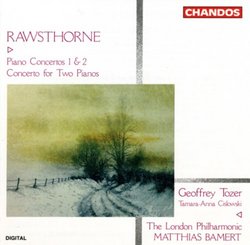Highly memorable solo concertos, profound yet accessible
i.jenkins@virgin.net | Goring on Thames, England | 01/16/1999
(5 out of 5 stars)
"Rawsthorne was a curious English composer - a bit of a Vamp to look at, he appeared to have followed the flippant style of Constant Lambert but Rawsthorne was made of sterner stuff. Well known for a number of classic film scores (1950's WWII stuff usually), this disc shows the extraordinary melodic talent of this composer. The first concerto is seemingly lightweight, full of elegant 'pretty' touches, but never sugary. It is full of delights and makes a welcome change from his contemporaries music. Don't get me wrong, this isn't shallow music at all, just beautifully and elegantly crafted. The second concerto is 'heavier' but still accessible, while the double concerto is less rewarding.All in all, this disc is one that will sit inside your CD player rather than gather dust on your shelves.Very strongly recommended."
Boisterous Good Humor
Thomas F. Bertonneau | Oswego, NY United States | 03/10/2001
(5 out of 5 stars)
"Early in his composing career, say Humphrey Searle and Robert Layton in their 1972 survey of "Twentieth Century Composers (Britain, Scandinavia and the Netherlands)," the formiably talented Alan Rawsthorne (1905-1971) "had... developed a freely atonal style, to some extent based on false relations, a style which he was to use for twenty years or more; every bar of his music is unmistakably Rawsthorne." Lest those words, "freely atonal," portend a scandal, let it swiftly be added that Rawsthorne's music rarely, if ever, abandons audible tonal centers, is full of apprehensible tunes and motifs, and is orchestrated with great care for the clarity of its textures. He is far from being an "atonalist," although he does like to "thicken" his chords with added, chromatic notes. Just how accessibly Rawsthorne wrote can be gleaned from his three pithy keyboard concertos, Nos. 1 (1939) and 2 (1951) being for solo piano and orchestra, and the third (1967) being for two pianos and orchestra. Admirers of Rawsthorne must hope that Naxos will offer these works as part of their presumably ongoing effort to make his music available in their budget catalogue. Meanwhile, the redoubtable Chandos label maintains their CD of these three genial works on their list. Matthias Bamert leads the London Philharmonic. Geoffrey Tozer is joined by Tamara-Anna Cislowski in the two-piano concerto. Rawsthorne originally scored his Piano Concerto No. 1 for keyboard solo, strings, and percussion, orchestrating it fully in 1942. Without pushing the resemblance too far, one could say that Rawsthorne's music shares with Bohuslav Martinu's a pervasive nervous energy, expressed in the employment of perpetual ostinati, but that the implication of neurosis is invariably dispelled by a boisterous good humor that refuses to be suppressed. The middle-movement Chaconne builds up impressive tension. The Finale diffuses the tension in a Tarantella that might fairly be characterized as jocose. (Rawsthorne admitted to a strain of "vulgarity" in his artistic constitution.) The Piano Concerto No. 2 is larger in scale (26 minutes to No. 1's 18): Rawsthorne lays it out in four, rather than the typical three, movements. The Finale (Allegro) is a kind of Rhumba in popular style, extremely catchy and hummable, but also full of rhythmic subtleties which the development entertainingly exploits. The Concerto for Two Pianos and Orchestra is scherzo-like throughout. The central Adagio is brief (a mere 3.40). The Finale consists of a theme and variations - the most typical of Rawsthorne's devices. (His very first orchestral score was the remarkable set of "Symphonic Studies" [1938] which combines a theme-and-variations with the outlines of an abbreviated five-movement symphony. See the new Naxos recording.) I find it difficult to imagine a listener not liking these three outgoing concertos. They make a good introduction to Rawsthorne. The three symphonies used to be available on a Lyrita CD. Putting the symphonies back into circulation is the most pressing current need in the case of Alan Rawsthorne. But snap up the keyboard concertos while they're still available."


 Track Listings (10) - Disc #1
Track Listings (10) - Disc #1